Faina Chiang Fang-liang (蔣方良), widow of Chiang Ching-kuo (蔣經國) and first lady of the Republic of China on Taiwan from 1978 to 1988, died yesterday at 12:40pm.
She died of respiratory failure brought on by lung cancer at age 88. But for her title of first lady, most in Taiwan know little of her. Unlike her predecessor, Soong Mayling (蔣宋美齡), who glittered both on the domestic and the international stage, Chiang Fang-liang was always a first lady in the shadows.
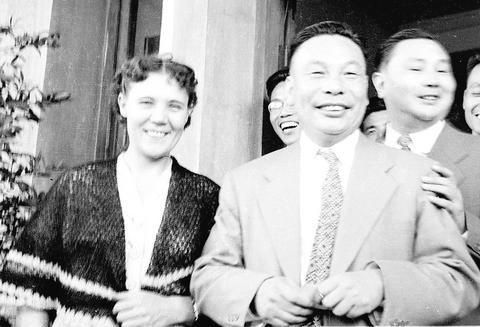
PHOTO: AP/CNA
Born Faina Epatcheva Vahaleva in Sverdlovsk, Siberia (now Ekateringburg, Russia), Vahaleva was orphaned at a young age and raised by her older sister Anna. An outspoken member of the Communist Youth League, Vahaleva met Chiang Ching-kuo at the age of 16 at the Ural Heavy Machinery Plant in Siberia, where Chiang was working in exile after his father, Chiang Kai-shek (
Vahaleva married Chiang Ching-kuo two years after they met, on March 15, 1935. Their first son, Hsiao-wen (孝文) was born in December 1935. The couple had two more sons, Hsiao-wu (孝武) and Hsiao-yung (孝勇) and a daughter (孝章).
Not long after the couple's marriage, Chiang Ching-kuo's reserve communist party member status was cancelled and he was not allowed to work. Vahaleva became the sole bread-winner for the family of three.
In early 1937, relations between China and the USSR eased. Stalin dramatically allowed Chiang to return to China. Perhaps Vahaleva had thought little of the different language, culture and traditions in China that would no doubt be a great barrier to her, or perhaps her love for her husband gave her all the courage needed. In any case, the Russian bride followed her husband to China.
Chiang Kai-shek was reportedly at first dismayed to have a Communist Russian daughter-in-law. But after the two met, Vahaleva -- who has been described as possessing the virtues of a traditional Chinese woman to a greater degree than a Chinese woman -- soon won the approval of her father-in-law and was given the name Fang-liang.
Chiang Fang-liang stayed behind to live with Chiang Ching-kuo's mother, Chiang Kai-shek's first wife, Mao Fu-mei (
Perhaps it was because of self-consciousness regarding her Mandarin -- with her Russian accent and Ningbo dialect -- that when Chiang Ching-kuo later became president, Fang-liang was often anxious about appearing in public.
If the traditional role of First lady was to be the silent shadow behind the president, Fang-liang filled it perfectly. Throughout her husband's political career, she stayed out of the public spotlight.
Little was ever known of her, except for her modest and simple lifestyle. She even exhibited the habits of a peasant housewife. She was used to doing all the household chores herself instead of employing servants. She would ask for her husband's approval for everything. Private household expenses, such as water and electricity bills, as well as salaries for servants, were all paid directly by Fang-liang from Chiang Ching-kuo's paycheck, instead of being deducted as public expenses.
Once a subordinate suggested to her, "everyone else deducts these as public expenses, why don't you let me handle them?"
Fang-liang replied that she had to ask her husband first, and called back a few days later saying, "No. He said no. We have to pay these ourselves."
Fang-liang mastered English after coming to Taiwan, and her fluency enabled her to access world news and events through English publications -- which probably limited her knowledge of her husband's affair with Chang Ya-ruo (
After Chiang Ching-kuo died, Fang-liang reportedly asked her second son Hsiao-wu, "I only have three sons, why are there reports saying I have five?"
Hsiao-wu, who had publicly reconciled with his half-brother Chang Hsiao-yan (章孝嚴/John Chang) chose to respond with silence.
The affair Chiang Ching-kuo had with Chang Ya-ruo occurred around 1940, and she bore him two sons: Hsiao-yan and Hsiao-tzu (孝慈).
No one, not even Hsiao-wu, knew if Fang-liang was aware of her husband's past romance with Chang Ya-ruo, but no one wanted to destroy the image of Chiang Ching-kuo in Fang-liang's heart.
Her old age was beset by ill-health, including heart disease, diabetes and chronic obstructive pulmonary disease, and the tragic loss of first her husband, then her sons. Chiang Ching-kuo passed away in 1988. Of her three sons, Hsiao-wen died in in 1989, Hsiao-wu in 1991 and Hsiao-yung in 1996.
Her health further deteriorated four years ago with the discovery of a tumor in the upper part of her left lung. When she underwent an X-ray examination on Dec. 6, fluid was discovered in her left lung. After being plagued by ill-health for over 10 years, Chiang Fang-liang's heart finally ceased beating at 12:10pm yesterday at Taipei Veterans General Hospital.
Few first ladies in history stand out as being influential. Soong Mayling of the ROC, the US' Hilary Clinton and Eva Peron of Argentina are perhaps exceptions, but unlike them, Chiang Fang-liang endured a life away from her home country, and coped with being placed in the awkward position of being the first lady of an anti-communist nation when her own country was the proselytizer of world communism. And she lived out her final years alone, with her remaining daughter living in the US and most of her friends having passed away.
Chiang Fang-liang lived her life with the weighty crown of first lady. While she never enjoyed the glamour associated with the title, she will be remembered for her stoicism.
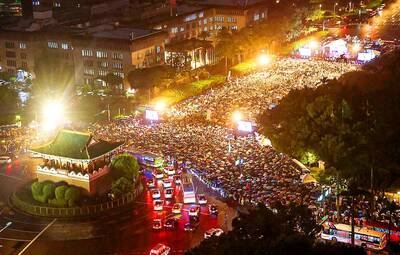
FINAL COUNTDOWN: About 50,000 attended a pro-recall rally yesterday, while the KMT and the TPP plan to rally against the recall votes today Democracy activists, together with arts and education representatives, yesterday organized a motorcade, while thousands gathered on Ketagalan Boulevard in Taipei in the evening in support of tomorrow’s recall votes. Recall votes for 24 Chinese Nationalist Party (KMT) lawmakers and suspended Hsinchu City mayor Ann Kao (高虹安) are to be held tomorrow, while recall votes for seven other KMT lawmakers are scheduled for Aug. 23. The afternoon motorcade was led by the Spring Breeze Culture and Arts Foundation, the Tyzen Hsiao Foundation and the Friends of Lee Teng-hui Association, and was joined by delegates from the Taiwan Statebuilding Party and the Taiwan Solidarity
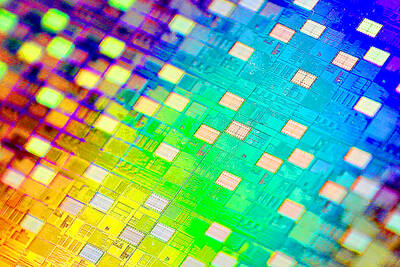
Instead of threatening tariffs on Taiwan-made chips, the US should try to reinforce cooperation with Taiwan on semiconductor development to take on challenges from the People’s Republic of China (PRC), a Taiwanese think tank said. The administration of US President Donald Trump has threatened to impose across-the-board import duties of 32 percent on Taiwan-made goods and levy a separate tariff on semiconductors, which Taiwan is hoping to avoid. The Research Institute for Democracy, Society, and Emerging Technology (DSET), a National Science and Technology Council think tank, said that US efforts should focus on containing China’s semiconductor rise rather than impairing Taiwan. “Without
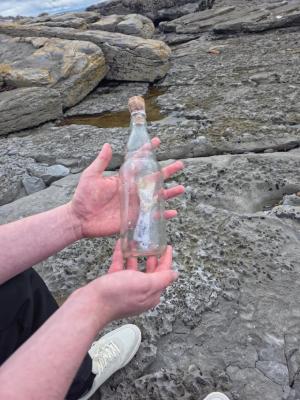
An SOS message in a bottle has been found in Ireland that is believed to have come from the Taiwanese captain of fishing vessel Yong Yu Sing No. 18 (永裕興18號), who has been missing without a trace for over four years, along with nine Indonesian crew members. The vessel, registered to Suao (蘇澳), went missing near Hawaii on Dec. 30, 2020. The ship has since been recovered, but the 10 crew members have never been found. The captain, surnamed Lee (李), is believed to have signed the note with his name. A post appeared on Reddit on Tuesday after a man
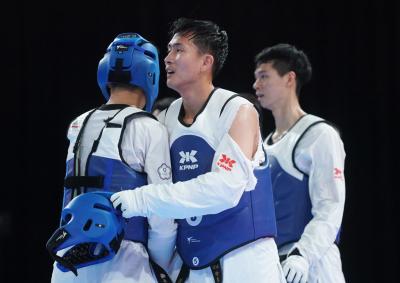
President William Lai (賴清德) today condemned an alleged attempt by two Chinese to snatch a letter of congratulations handed to Taiwan’s taekwondo team after they won silver at the Summer World University Games in Essen, Germany, yesterday. A Chinese man and woman reportedly tried to snatch a congratulatory letter to athletes Hung Jiun-yi (洪俊義), Jung Jiun-jie (鍾俊傑) and Huang Cho-cheng (黃卓乘) from the Ministry of Education, and then argued with media employees. “Why are you taking our things?” the media employees asked. “Does that say Chinese Taipei?” the two Chinese reportedly said. Following the incident, Sports Administration Director-General Cheng Shih-chung (鄭世忠) wrote on